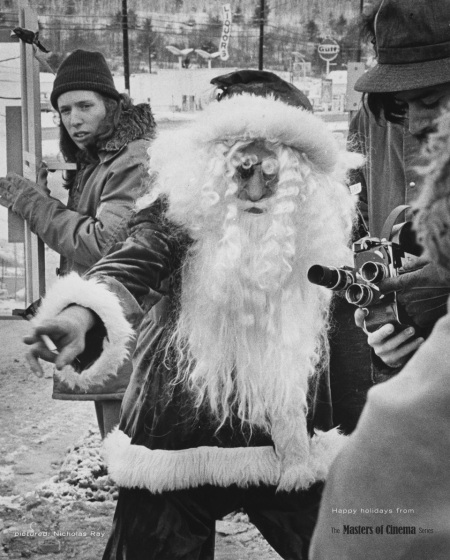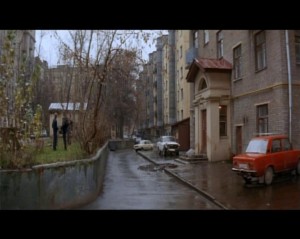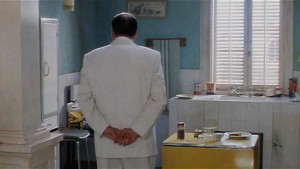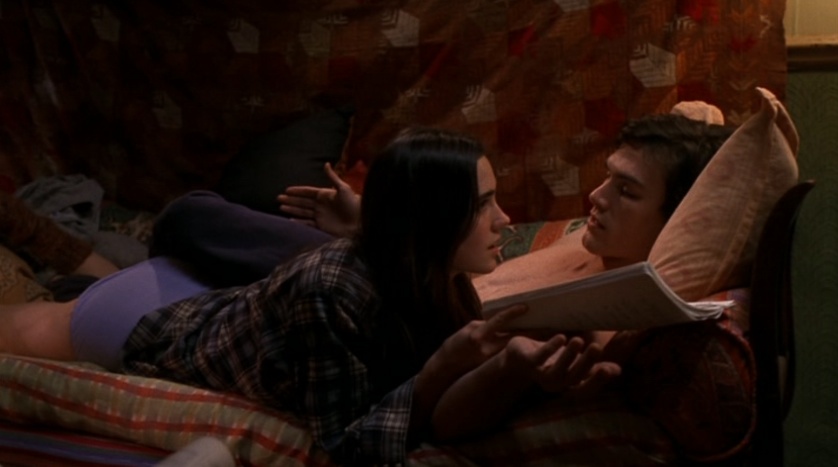From the Autumn 1973 issue of Sight and Sound. — J.R.

Surfacing in Cannes in the worst of conditions — not quite finished, unsubtitled, shrieking with technical problems of all kinds, and dropped into the lap of an exhausted press fighting to stay awake through the fifteenth and final afternoon of the festival — Nicholas Ray’s WE CAN’T GO HOME AGAIN may have actually hurried a few critics back to their homes; but it probably shook a few heads loose in the process. Clearly it wasn’t the sort of experience anyone was likely to come to terms with, much less assimilate, in such an unfavorable setting, although the demands it makes on an audience would be pretty strenuous under any circumstances.
Created in collaboration with Ray’s film class at the State University of New York at Binghamton, and featuring Ray and his students, the film attempts to do at least five separate things at once: (1) describe the conditions and ramifications of the filmmaking itself, from observations at the editing table to all sorts of peripheral factors (e.g., a female student becoming a part-time prostitute in order to raise money for the film); (2) explore the political alienation experienced by many young Americans in the late 60s and early 70s; (3) demystify Ray’s image as a Hollywood director, in relation to both his film class and his audience; (4) implicate the private lives and personalities of Ray and his students in all of the preceding; and (5) integrate these concerns in a radical form that permits an audience to view them in several aspects at once. Read more
From the Chicago Reader (December 14, 1990). Note: Twilight Time has recently released The Russia House on Blu-Ray. — J.R.


THE RUSSIA HOUSE
*** (A must-see)
Directed by Fred Schepisi
Written by Tom Stoppard
With Sean Connery, Michelle Pfeiffer, Roy Scheider, James Fox, John Mahoney, J.T. Walsh, Ken Russell, David Threlfall, and Klaus Maria Brandauer.
HAVANA
** (Worth seeing)
Directed by Sydney Pollack
Written by Judith Rascoe and David Rayfiel
With Robert Redford, Lena Olin, Alan Arkin, Tomas Milian, Raul Julia, Richard Farnsworth, Mark Rydell, Daniel Davis, and Tony Plana.


The Russia House and Havana are both lavishly mounted love stories, packed with action and developed in relation to political intrigues abroad. What’s surprising about both is that although they’re Hollywood movies to the core, the American characters aren’t exactly the good guys.
In The Russia House the only important American characters are villains, while the hero is British and the heroine Russian. In Havana the hero is as American as they come, and he certainly behaves heroically, yet the film as a whole raises doubts about whether he has missed the boat, historically speaking. We entertain fewer doubts in this respect about the heroine, a Swede with an American passport who’s married to a Cuban. Read more
From the Chicago Reader (March 24, 2000). — J.R.

Waking the Dead
Rating ** Worth seeing
Directed by Keith Gordon
Written by Robert Dillon
With Billy Crudup, Jennifer Connelly, Molly Parker, Janet McTeer, Paul Hipp, Sandra Oh, and Hal Holbrook.
I can’t make any great claims for Keith Gordon’s fourth feature as a director — a tragic love story that might be described as a political allegory, limited by the affective range of its lead actor (Billy Crudup), who plays a smarmy politician, and by the smudgy articulation of some secondary details. Yet the movie has a quality and intensity of feeling that provoke respect and a sense of fellowship — something that makes me cherish some of its attributes.

I can cite only one unequivocal reason for seeing Waking the Dead, and that’s Jennifer Connelly, who plays Sarah Williams — a Catholic activist who, when the story opens, seemingly dies when the car she and two pro-Allende Chileans are driving through Minneapolis is bombed. What makes Connelly so remarkable isn’t her character’s radicalism but her capacity to keep the character fresh every time she appears and to leave a lingering impression that makes the hero’s (and the movie’s) sense of loss acute. Read more







